- Home
- Tahereh Mafi
Destroy Me Page 5
Destroy Me Read online
Page 5
Page 5
I bend down to pick it up, carefully shaking out bits and pieces of glass from the pages. My hand is unsteady, my heart pounding in my ears. I have no idea what this might contain. Pictures. Notes. Scrambled, half-formed thoughts.
It could be anything.
I flip the notebook over in my hands, my fingers memorizing its rough, worn surface. The cover is a dull shade of brown, but I can’t tell if it’s been stained by dirt and age, or if it was always this color. I wonder how long she’s had it. Where she might’ve acquired it.
I stumble backward, the backs of my legs hitting her bed. My knees buckle, and I catch myself on the edge of the mattress. I take in a shaky breath and close my eyes.
I’d seen footage from her time in the asylum, but it was essentially useless. The lighting was always too dim; the small window did little to illuminate the dark corners of her room. She was often an indistinguishable form; a dark shadow one might never even notice. Our cameras were only good at detecting movement—and maybe a lucky moment when the sun hit her at the right angle—but she rarely moved. Most of her time was spent sitting very, very still, on her bed or in a dark corner. She almost never spoke. And when she did, it was never in words. She spoke only in numbers.
Counting.
There was something so unreal about her, sitting there. I couldn’t even see her face; couldn’t discern the outline of her figure. Even then she fascinated me. That she could seem so calm, so still. She would sit in one place for hours at a time, unmoving, and I always wondered where she was in her mind, what she might be thinking, how she could possibly exist in that solitary world. More than anything else, I wanted to hear her speak.
I was desperate to hear her voice.
I’d always expected her to speak in a language I could understand. I thought she’d start with something simple. Maybe something unintelligible. But the first time we ever caught her talking on camera, I couldn’t look away. I sat there, transfixed, nerves stretched thin, as she touched one hand to the wall and counted.
4,572.
I watched her count. To 4,572.
It took five hours.
Only afterward did I realize she was counting her breaths.
I couldn’t stop thinking about her after that. I was distracted long before she arrived on base, constantly wondering what she might be doing and whether she’d speak again. If she wasn’t counting out loud, was she counting in her head? Did she ever think in letters? Complete sentences? Was she angry? Sad? Why did she seem so serene for a girl I’d been told was a volatile, deranged animal? Was it a trick?
I’d seen every piece of paper documenting the critical moments in her life. I’d read every detail in her medical records and police reports; I’d sorted through school complaints, doctors’ notes, her official sentencing by The Reestablishment, and even the asylum questionnaire submitted by her parents. I knew she’d been pulled out of school at fourteen. I knew she’d been through severe testing and was forced to take various—and dangerous—experimental drugs, and had to undergo electroshock therapy. In two years she’d been in and out of nine different juvenile detention centers and had been examined by more than fifty different doctors. All of them described her as a monster. They called her a danger to society and a threat to humanity. A girl who would ruin our world and had already begun by murdering a small child. At sixteen, her parents suggested she be locked away. And so she was.
None of it made sense to me.
A girl cast off by society, by her own family—she had to contain so much feeling. Rage. Depression. Resentment. Where was it?
She was nothing like the other inmates at the asylum—the ones who were truly disturbed. Some would spend hours hurling themselves at the wall, breaking bones and fracturing skulls. Others were so deranged they would claw at their own skin until they drew blood, literally ripping themselves to pieces. Some had entire conversations with themselves out loud, laughing and singing and arguing. Most would tear their clothes off, content to sleep and stand naked in their own filth. She was the only one who showered regularly or even washed her clothes. She would take her meals calmly, always finishing whatever she was given. And she spent most of her time staring out the window.
She’d been locked up for almost a year and had not lost her sense of humanity. I wanted to know how she could suppress so much; how she’d achieved such outward calm. I’d asked for profiles on the other prisoners because I wanted comparisons. I wanted to know if her behavior was normal.
It wasn’t.
I watched the unassuming outline of this girl I could not see and did not know, and I felt an unbelievable amount of respect for her. I admired her, envied her composure—her steadiness in the face of all she’d been forced to endure. I don’t know that I understood what it was, exactly, I was feeling at the time, but I knew I wanted her all to myself.
I wanted to know her secrets.
And then one day, she stood up in her cell and walked over to the window. It was early morning, just as the sun was rising; I caught a glimpse of her face for the very first time. She pressed her palm to the window and whispered two words, just once.
Forgive me.
I hit rewind too many times.
I could never tell anyone I’d developed a newfound fascination with her. I had to effect a pretense, an outward indifference—an arrogance—toward her. She was to be our weapon and nothing more, just an innovative instrument of torture.
A detail I cared very little about.
My research had led me to her files by pure accident. Coincidence. I did not seek her out in search of a weapon; I never had. Far before I’d ever seen her on film, and far, far before I ever spoke a word to her, I had been researching something else. For something else.
My motives were my own.
Utilizing her as a weapon was a story I fed to my father; I needed an excuse to have access to her, to gain the necessary clearance to study her files. It was a charade I was forced to maintain in front of my soldiers and the hundreds of cameras that monitor my existence. I did not bring her on base to exploit her ability. And I certainly did not expect to fall for her in the process.
But these truths and my real motivations will be buried with me.
I fall hard onto the bed. Clap a hand over my forehead, drag it down the length of my face. I never would’ve sent Kent to stay with her if I could’ve taken the time to go myself. Every move I made was a mistake. Every calculated effort was a failure. I only wanted to watch her interact with someone. I wondered if she’d seem different; if she’d shatter the expectations I’d already formed in my mind by simply having a normal conversation. But watching her talk to someone else made me crazy. I was jealous. Ridiculous. I wanted her to know me; I wanted her to talk to me. And I felt it then: this strange, inexplicable sense that she might be the only person in the world I could really care about.
I force myself to sit up. I hazard a glance at the notebook still clutched in my hand.
I lost her.
She hates me.
She hates me and I repulse her and I might never see her again, and it is entirely my own doing. This notebook might be all I have left of her. My hand is still hovering over the cover, tempting me to open it and find her again, even if it’s only for a short while, even if it’s only on paper. But part of me is terrified. This might not end well. This might not be anything I want to see. And so help me, if this turns out to be some kind of diary concerning her thoughts and feelings about Kent, I might just throw myself out the window.
I pound my fist against my forehead. Take a long, steadying breath.
Finally, I flip it open. My eyes fall to the first page.
And only then do I begin to understand the weight of what I’ve found.
I keep thinking I need to stay calm, that it’s all in my head, that everything is going to be fine and someone is going to open the door now, someone is going to let me out of here. I keep thinking it’s go
ing to happen. I keep thinking it has to happen, because things like this don’t just happen. This doesn’t happen. People aren’t forgotten like this. Not abandoned like this.
This doesn’t just happen.
My face is caked with blood from when they threw me on the ground, and my hands are still shaking even as I write this. This pen is my only outlet, my only voice, because I have no one else to speak to, no mind but my own to drown in and all the lifeboats are taken and all the life preservers are broken and I don’t know how to swim I can’t swim I can’t swim and it’s getting so hard. It’s getting so hard. It’s like there are a million screams caught inside of my chest but I have to keep them all in because what’s the point of screaming if you’ll never be heard and no one will ever hear me in here. No one will ever hear me again.
I’ve learned to stare at things.
The walls. My hands. The cracks in the walls. The lines on my fingers. The shades of gray in the concrete. The shape of my fingernails. I pick one thing and stare at it for what must be hours. I keep time in my head by counting the seconds as they pass. I keep days in my head by writing them down. Today is day two. Today is the second day. Today is a day.
Today.
It’s so cold. It’s so cold it’s so cold.
Please please please
I slam the cover shut.
I’m shaking again, and this time I can’t stop it. This time the shaking is coming from deep within my core, from a profound realization of what I’m holding in my hands. This journal is not from her time spent here. It has nothing to do with me, or Kent, or anyone at all. This journal is a documentation of her days spent in the asylum.
And suddenly this small, battered notebook means more to me than anything I’ve ever owned.
Ten
I don’t even know how I manage to get myself back to my own rooms so quickly. All I know is that I’ve locked the door to my bedroom, unlocked the door to my office only to lock myself inside, and now I’m sitting here, at my desk, stacks of papers and confidential material shoved out of the way, staring at the tattered cover of something I’m very nearly terrified to read. There’s something so personal about this journal; it looks as if it’s been bound together by the loneliest feelings, the most vulnerable moments of one person’s life. She wrote whatever lies within these pages during some of the darkest hours of her seventeen years, and I’m about to get exactly what I’ve always wanted.
A look into her mind.
And though the anticipation is killing me, I’m also acutely aware of just how badly this might backfire. I’m suddenly not sure I even want to know. And yet I do. I definitely do.
So I open the book, and turn to the next page. Day three.
I started screaming today.
And those four words hit me harder than the worst kind of physical pain.
My chest is rising and falling, my breaths coming in too hard. I have to force myself to keep reading.
I soon realize there’s no order to the pages. She seems to have started back at the beginning after she came to the end of the notebook and realized she’d run out of space. She’s written in the margins, over other paragraphs, in tiny and nearly illegible fonts. There are numbers scrawled all over everything, sometimes the same number repeating over and over and over again. Sometimes the same word has been written and rewritten, circled and underlined. And nearly every page has sentences and paragraphs almost entirely crossed out.

 Shatter Me
Shatter Me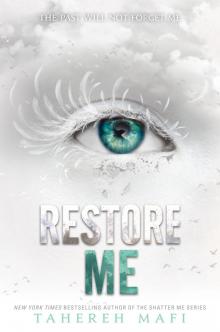 Restore Me
Restore Me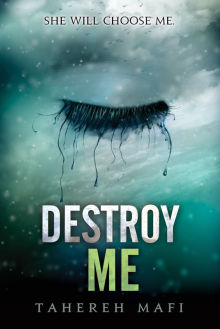 Destroy Me
Destroy Me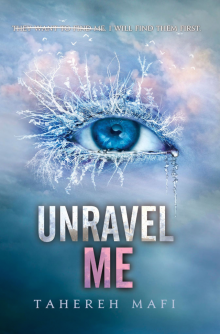 Unravel Me
Unravel Me Ignite Me
Ignite Me Defy Me
Defy Me Fracture Me
Fracture Me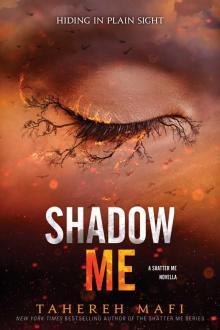 Shadow Me
Shadow Me Whichwood
Whichwood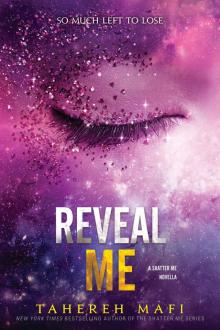 Reveal Me
Reveal Me Furthermore
Furthermore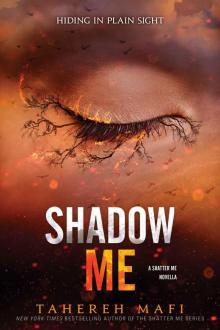 Shadow Me (Shatter Me Novella)
Shadow Me (Shatter Me Novella)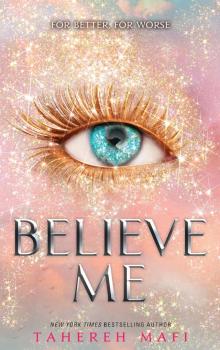 Believe Me
Believe Me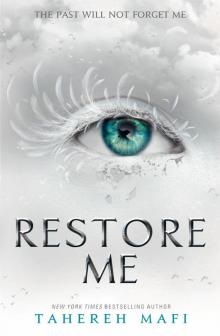 Restore Me (Shatter Me)
Restore Me (Shatter Me) Imagine Me
Imagine Me An Emotion of Great Delight
An Emotion of Great Delight Find Me
Find Me A Very Large Expanse of Sea
A Very Large Expanse of Sea Unravel Me: The Juliette Chronicles Book 2
Unravel Me: The Juliette Chronicles Book 2